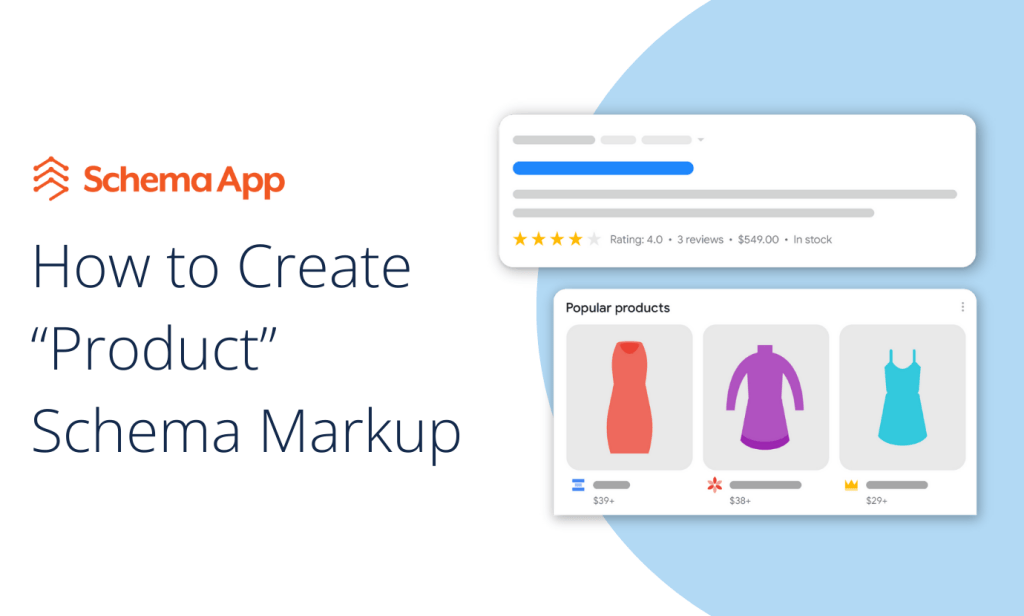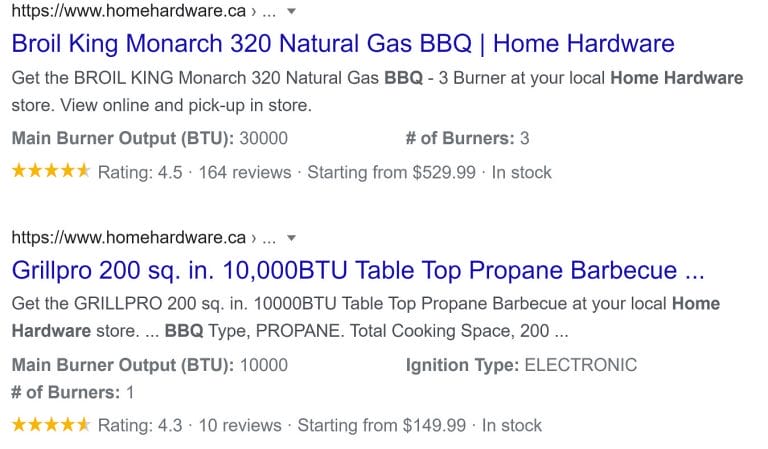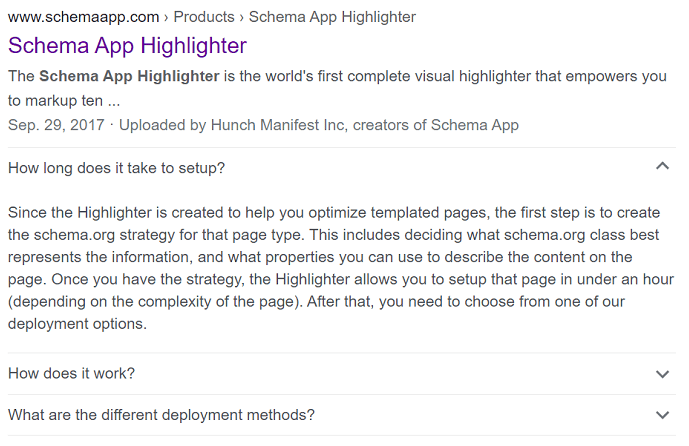The Definitive Guide To
Introduction
Ecommerce stores can instantly boost their search engine optimization performance through the implementation of structured data. Highlight important product information in organic search results for your existing and prospective customers with schema markup, including price, ratings, reviews, shipping information, and more.
What is Structured Data?
Structured data is basically code written in a specific format so that search engines can understand your website content. When search engines read this code, they can display the information with enhanced results in search called rich results.
Why Structured Data for Ecommerce
Structured is an advanced SEO strategy that helps ecommerce brands drive more quality organic search traffic to their online stores. Capture buyers’ attention at different stages of their customer journey through visually engaging rich results, which display information about your products and services right on the search engine results pages.
What if all your Products looked like this in search? This is a rich result.
Rich results are powered by structured data.
Are you new to structured data for the ecommerce industry? Our guide takes you from strategy to results, with real stories from prominent ecommerce brands. Save a FREE copy to keep for reference.
Schema App is committed to protecting your privacy. By submitting this form you are agreeing to our Privacy Policy, and you are welcome to unsubscribe at any time.
Structured Data Drives Results + ROI
Here are three leading ecommerce organizations. Read about their Schema App Experiences driving results from structured data.
290%
more impressions
190%
more clicks
“Schema has become the future of search and is rapidly evolving. As customers continue to shift their shopping habits, search engine optimization has become even more pivotal to our growing business. Home Hardware is an industry leader in this space and Schema App has made it effortless to stay on top of all the changes.”
– Trevor Heal, E-Commerce Product Manager, Home Hardware
20%
year-over-year growth
19
microsites marked up
“I know a lot about Schema, but I don’t have to with Schema App, which is what I think is really amazing about your company.”
– Havalah Gholdston, SEO Manager, Keen Footwear
Further Reading on Structured Data for Ecommerce
Schema.org Version 13 Release: Products, Healthcare, Videos, and more!
eCommerce Schema Markup Strategies for Successful Brands
How to do Schema Markup for Product Model Variants
Structured Data Markup for Google Merchant Center Feed
Future Proof your Brand for the New Search and Voice Assistant Age
What is Structured Data?
Product entities and review snippets are two of the most important considerations for any brand with an e-commerce presence. Customers want to know the most up-to-date information about your products and/or services. Schema App’s dynamic schema markup solutions ensure your schema reflects any updates to your content so your rich results are always current.
Having an aggregate star rating and reviews can improve click-through-rates and conversion rates. According to BrightLocal’s 2020 Local Consumer Review Survey, 87% of consumers read online reviews for local businesses.
Here are the essential product markup properties that we recommend:
- Price
- Product Name
- Product Description
- High-Resolution Product Images
- Availability
- Brand
- Reviews
- Breadcrumbs
To be eligible for product rich results in search, Google recommends marking up your product pages. Read more about Google’s guidelines for product schema markup here. Marking up your product information not only makes it eligible for rich results in search, but this information can also be displayed in Google Images.
Schema Markup for Product Models
Creating schema markup for a single product is straightforward and well documented. But things get more complicated when you’re creating markup for many variations of a product. There are three common strategies for modeling product variations so you can optimize your markup for search engines.
- Simplified and Aggregate Product Offers
- Each Variant as an Individual Offer
- Each Variant as a Product Model
Ecommerce Rich Results Examples
You may already be familiar with product rich results which let your customers see the price and availability of your products right on the search engine results page.
Let’s explore some other types of rich results that can help your products or services stand out in search and drive more customers to your e-commerce site.
Continue reading to see the following rich results:

Review Snippets for Ecommerce Stores
After receiving excellent reviews from your customers, showcase them in search by marking up your website. Adding review structured data to your web pages can make your content eligible for the Review Snippet rich result. If Google finds valid review or rating markup, your content could display a short excerpt of the reviews and an aggregate star rating in search.
Frequently Asked Questions (FAQs) Rich Results for Ecommerce Stores
Frequently asked questions are a great way to drive more customer engagement for your e-commerce site. Write out questions that you think your customers may query on your website, and then mark up the content with FAQPage Schema to see these FAQs show up in search results.
HowTo Rich Results for Ecommerce Stores
Another opportunity for customer engagement is through HowTo schema markup. Not only do HowTo rich results show users visuals of step-by-step directions, but HowTo content supports your E-E-A-T because you’re demonstrating to search engines that you are a trusted source of information for specific activities. Your HowTo content shows prospective buyers how to use the products you sell, or which products are best for a specific activity.
Frequently Asked Questions about Ecommerce Structured Data
What types in the schema.org vocabulary are specific to ecommerce?
Product entities and review snippets are two of the most important considerations for any brand with an e-commerce presence. Customers want to know the most up-to-date information about your products and/or services.
Here are the essential product markup properties that we recommend:
- Price
- Product Name
- Product Description
- High-Resolution Product Images
- Availability
- Brand
- Reviews
- Breadcrumbs
To be eligible for product rich results in search, Google recommends marking up your product pages. Read more about Google’s guidelines for product schema markup here. Marking up your product information not only makes it eligible for rich results in search, but this information can also be displayed in Google Images.
How can I measure the success of my ecommerce structured data?
To assess changes in your site’s metrics, consider using Google Analytics. If you’d like more information about search-engine performance and the health of your markup, consider using Google Search Console, SEMRush or the Schema App Analyzer.
Learn more about How to Measure the Impact of Structured Data.
What is Google Shopping?
Google Shopping isn’t technically an online marketplace. It’s more of an ad platform where you can advertise your products, providing shoppers an opportunity to browse physical products based on a search query. Google Shopping is also known as a Comparison Shopping Engine (CSE), where shoppers search for, compare and shop for physical products across different retailers.
What is Google Merchant Center?
Google Merchant Center is an online dashboard where you can manage your shop and product appearance and make it available to shoppers across Google. You can upload and maintain product information and your online listings where needed, including pictures and pricing that can be displayed in Google Shopping searches. Google Merchant Center also integrates with other Google services like Google Business Profile (GBP), allowing you to reach potential customers at different stages of their buyer journey.
How do I mark up my products for Google Merchant Center Feed?
It’s recommended that you add new schema markup to your product pages to help Google reliably retrieve up-to-date information, and enable click-driving search features like Automatic Item Updates, Google Sheets Merchant Center add-on, and Product Rich Results. This ensures that you’re set up optimally and simplifies the creation and maintenance of your product feed in search.
Learn more about Structured Data Markup for Google Merchant Center Feed.
Schema App is at the forefront of schema markup strategy and implementation, providing enterprise solutions to some of the top clients across the world. To learn more about our structured data solutions and how we can help you reach your online business goals, contact our expert team. We’d love to hear from you and help you get started!
Are you ready to start converting more customers for your ecommerce website?












